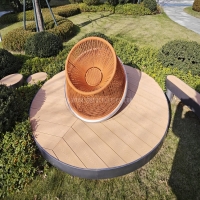Welcome to the website for landscape facilities products and knowledge.
What are the energy efficiency considerations for landscape bar counters with built-in appliances?
When designing landscape bar counters with integrated appliances, energy efficiency becomes a crucial consideration that impacts both operational costs and environmental sustainability. The unique outdoor nature of these installations presents distinct challenges and opportunities for energy conservation that differ from indoor kitchen setups.
The selection of appropriately sized appliances represents the foundational step in creating an energy-efficient outdoor bar. Undersized units must work excessively hard to maintain temperatures, while oversized equipment cycles frequently, both resulting in unnecessary energy consumption. For refrigeration components specifically designed for outdoor use, features such as increased insulation thickness and compressors rated for wider temperature variations significantly improve efficiency in fluctuating outdoor conditions.
Insulation quality throughout the bar structure profoundly affects energy performance. Proper insulation around appliance compartments, particularly for refrigeration units, reduces the thermal load and minimizes compressor runtime. Additionally, incorporating weather sealing around doors and access points prevents cool air leakage in summer and heat loss during colder months, further optimizing energy usage.
The strategic integration of energy-saving technologies substantially enhances efficiency. LED lighting systems consume approximately 75% less energy than traditional incandescent bulbs while generating minimal heat—a particular advantage in outdoor settings where ambient temperatures already challenge cooling appliances. Incorporating motion sensors or timers for lighting ensures illumination only when needed, preventing wasteful overnight operation.
Smart control systems represent another valuable efficiency component. Programmable thermostats for refrigeration units allow temperature adjustments based on usage patterns, while Wi-Fi enabled controls provide remote monitoring and adjustment capabilities. These systems can automatically enter energy-saving modes during periods of inactivity and send alerts for maintenance issues that might compromise efficiency, such as dirty condenser coils or door seal failures.
The positioning and orientation of the bar counter relative to environmental factors significantly influence energy demands. Locating refrigeration components away from direct sunlight and heat-generating appliances reduces thermal stress. Creating natural shading through strategic placement or incorporating structural elements like pergolas or roof overhangs minimizes solar heat gain, thereby decreasing cooling requirements.
When selecting materials for construction, those with thermal mass properties can help stabilize temperatures naturally. Stone or concrete surfaces absorb heat during the day and release it gradually at night, moderating temperature swings around appliances. Additionally, choosing light-colored materials for exterior surfaces reflects rather than absorbs solar radiation, contributing to lower ambient temperatures around the bar area.
Regular maintenance protocols ensure sustained energy efficiency. Cleaning condenser coils monthly during peak usage seasons maintains optimal heat transfer, while inspecting door seals prevents cool air leakage. Checking refrigerant levels and ensuring proper airflow around appliances all contribute to maintaining peak efficiency throughout the equipment's lifespan.
The integration of renewable energy sources presents innovative opportunities for powering outdoor bar appliances. Solar panels can be discreetly incorporated into nearby structures to offset energy consumption, particularly for lighting and low-power components. For properties with existing solar installations, dedicating a portion of generated electricity to outdoor entertainment areas creates a truly sustainable solution.
Water efficiency considerations, though not directly related to energy, contribute to overall sustainability. Installing aerators on faucets and choosing Energy Star rated ice makers reduce both water and energy consumption simultaneously, addressing multiple resource conservation goals within the landscape bar design.
Ultimately, creating an energy-efficient landscape bar counter requires a holistic approach that considers appliance selection, structural design, technological integration, and ongoing maintenance. By implementing these strategies, homeowners can enjoy fully functional outdoor entertainment spaces while minimizing energy consumption and environmental impact, proving that luxury outdoor living and sustainability can successfully coexist.
Related search:

Recommendation
Swivel chair-Specialty steel structure woven rattan leisure chair with rotatable design